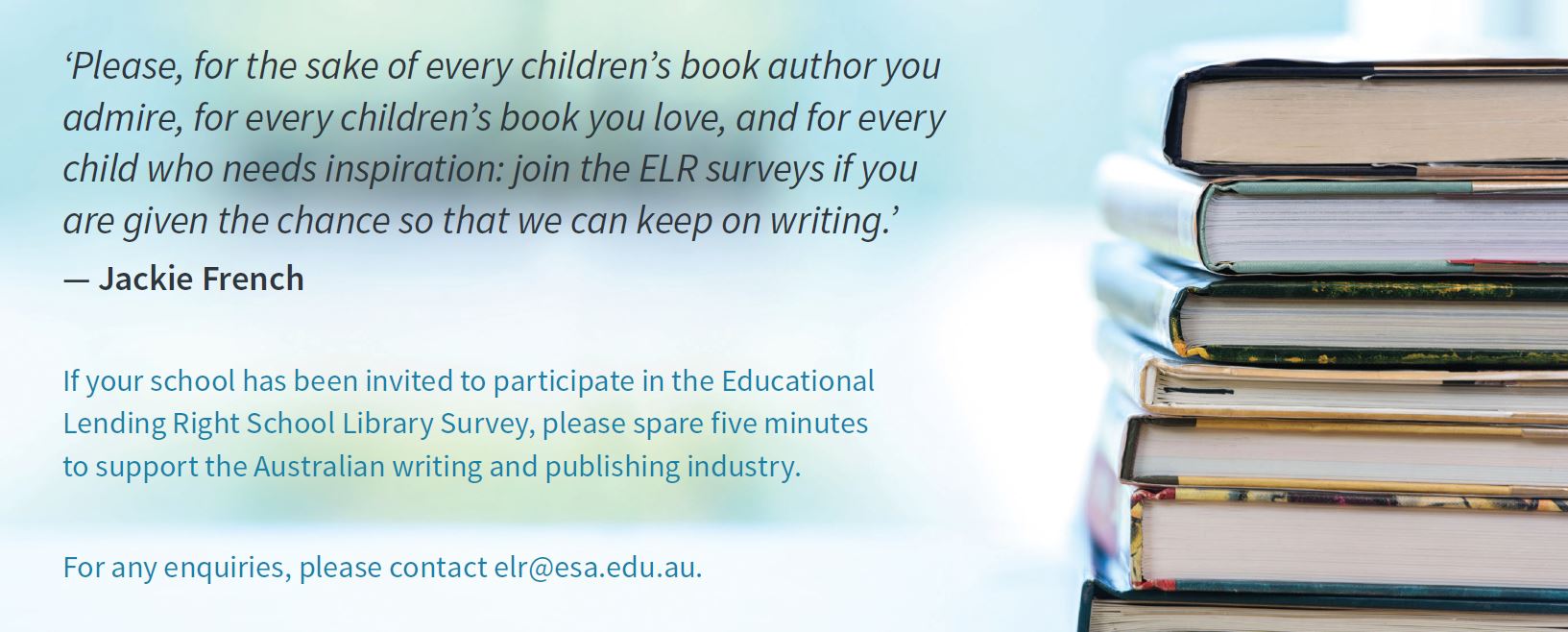Issue 103
Term 4 2017
- Feature article
- Articles
-
- A note from the editor
- Turning the school library into a thriving community hub
- Ten ways to advocate for your role as a teacher librarian
- Celebrating the school library officer
- The School Magazine
- The challenge of implementing change
- Know your rights and responsibilities: teaching digital citizenship
- Regular features
Download this issue
ELR, or the super fund you have when you don’t have a super fund
In Term 4, we invited 750 schools in Australia to participate in the Educational Lending Right School Library Survey. Acclaimed author Nadia Wheatley was part of the original committee that championed the ELR initiative in Australia, and here she shares her story.
After talking to hundreds of groups of students and teachers over some 40 years, I have come to feel that there are really only two questions that people want to ask an author. The first is: ‘Where do you get your ideas?’ The second is: ‘How much money do you earn?’ Teachers are too polite to ask the second question but kids regularly come up with it. I always say: ‘Less than your teachers’.
My annual Lending Right payment is a crucial part of this income.
While I love PLR (recompense for books held in public libraries), I feel a deep personal attachment to ELR, which is the lending right scheme connected with educational libraries. This is because I was a member and sometime chair of the committee that successfully lobbied the government to introduce the Educational Lending Right scheme in the mid-1990s. Composed of representatives from the Australian Society of Authors and the Australian Book Publishers Association, this committee was engaged in working out how an ELR scheme could be instituted and managed, as well as campaigning for its introduction. As part of that campaign, I contacted all the national and state organisations of school librarians, plus various teachers’ organisations, and explained why ELR was good for libraries and readers, as well as for book creators. As a result of these conversations, I am pleased to say that the leaders of all the organisations signed a letter of support for ELR.
Over the four or five years that all of this was going on, I was living in the Blue Mountains with an artist partner who earned even less than I did, and I was bringing up two teenagers. I was also writing full time; or trying to. Every time I sat on the train going to and from another ELR Committee meeting in Sydney, I told myself that this was time well spent. And every time I rang a writer colleague to persuade her to devote half an hour to signing a petition or writing a letter on behalf of the campaign, I told her to think of it as the most valuable half hour she might ever spend. How right I was! As I have got older, Lending Right payments have become even more important to me, and to many other book creators as well.
Unlike most Australian workers, authors and illustrators don’t get superannuation. Sure, I can join a super fund myself. But I do not have an employer contributing to my fund, to make a nest egg for my old age.
Once upon a time, publishers had wonderful things called backlists. This meant that the kind of books that I write were kept in print for a long time. This in turn meant that an author such as I could be fairly sure of receiving royalty income from new sales of these classic books into her old age. In short, the backlist was like a super fund.
Alas, over the last 20-odd years the backlist has joined the typewriter and the dodo. Try buying any of the CBCA-award-winning books from the 1980s or the 1990s, or even from the first decade of the 21st century. They are not out of date, but they are nearly all out of print. The only place you can find them, if you are lucky, is a library. And the only payment that their creators can get is Lending Right.
That’s why participation in the Educational Lending Right School Library Survey is so important; think of ELR as a little nest egg that will support your favourite author or illustrator so she can produce the next book that you will love.
Now, as to that other question, about ‘Where do you get your ideas?’ — I haven’t got a clue!
SCIS has commenced inviting 750 Australian schools to participate in this year’s ELR survey, which we coordinate on behalf of the Department of Communications and the Arts.
Participants are asked to run an automated survey within their library management system, which extracts a count of their total book holdings, and can be completed in just a few clicks.
The survey creates a national estimate of holdings in Australian school libraries, which is then used to recompense registered book creators for having their work freely accessible in schools. Participation is highly encouraged.

